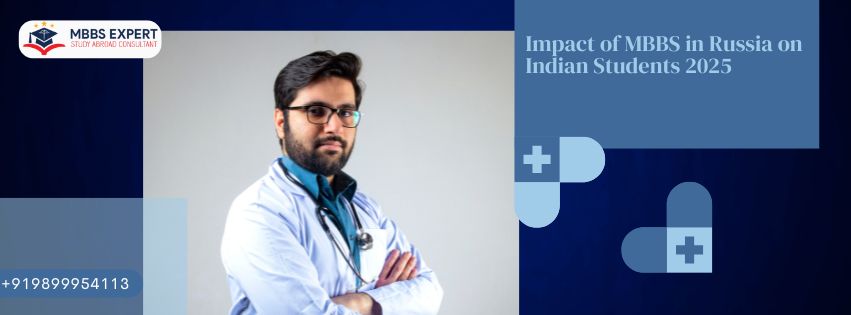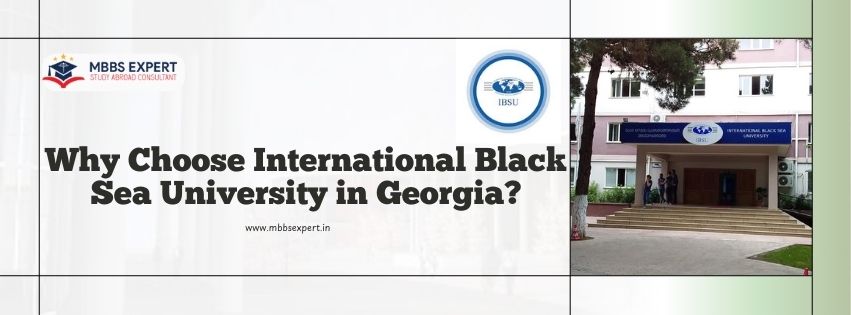Study in Georgia: The Academic Brilliance of International Black Sea University Introduction Studying abroad has…

Impact of MBBS in Russia on Indian Students 2025
![]()
Impact of MBBS in Russia on Indian Students 2025
The pursuit of medical education abroad has long been a popular choice among Indian students, especially when it comes to studying MBBS (Bachelor of Medicine, Bachelor of Surgery). Russia, with its prestigious medical universities and relatively affordable tuition fees, continues to attract a significant number of Indian students seeking quality medical education. In 2025, the impact of studying MBBS in Russia on Indian students remains profound, influencing their academic, professional, and personal lives in several ways.
Quality of Education and Recognition
One of the most significant impacts of pursuing MBBS in Russia for Indian students is the quality of education coupled with international recognition. Russia boasts several top medical universities that are recognized globally. Institutions like the First Moscow State Medical University, Kazan Federal University, and St. Petersburg State Medical University have a long-standing reputation for providing high-quality medical education. These universities are recognized by the World Health Organization (WHO) and the Medical Council of India (MCI), now known as the National Medical Commission (NMC).
The demanding curriculum at Russian medical universities closely mirrors international standards, particularly those followed in India.The education system emphasizes both theoretical knowledge and practical exposure. Indian students benefit from well-structured clinical rotations and a focus on practical training from early stages of their medical education. This ensures they are not only equipped with a solid academic foundation but also gain exposure to clinical practices, which is essential for their future careers.
In 2025, the recognition of Russian MBBS degrees continues to be an advantage for Indian students who plan to practice in India or other countries. With an increasing number of Indian students opting for this route, the collaboration between Russia and India strengthens, leading to mutual recognition of qualifications.
Cost-Effective Education and Accessibility
One of the key factors attracting Indian students to Russia is the cost-effectiveness of MBBS education. In 2025, this remains a major draw for students from middle-income families who might otherwise struggle to afford the high costs of medical education in India.
Tuition fees at Russian medical universities range from $3,000 to $7,000 per year, a fraction of what one might expect to pay in private medical colleges in India. Alongside affordable tuition, the cost of living in Russia is relatively low, particularly in cities like Kazan, Volgograd, and Yekaterinburg, making it a viable option for students looking to pursue medical studies without accumulating significant financial debt.
Furthermore, the Indian government’s collaboration with Russian universities has improved accessibility. Efforts such as the agreement between the NMC and Russian medical institutions ensure that Indian students face minimal bureaucratic hurdles when seeking admission, visas, and medical registration post-graduation.
Multicultural Exposure and Adaptability
Studying MBBS in Russia exposes Indian students to a diverse and multicultural environment, which significantly contributes to their personal and professional development. By 2025, the impact of this cultural exposure continues to foster adaptability among Indian students.
Living and studying in Russia introduces students to a new way of life, encouraging them to become more independent and self-reliant. The experiences of navigating a different culture, language, and lifestyle help students build resilience and adaptability, qualities that are essential for their future medical careers. Interaction with peers from various countries broadens their worldview and enhances cross-cultural understanding.
Moreover, learning Russian as the medium of instruction offers students the opportunity to interact more effectively with patients and medical staff during their clinical rotations. This language proficiency is not only a valuable skill but also enhances their ability to provide better patient care, particularly in rural and underserved areas of India.
Career Opportunities and Professional Growth
The impact of pursuing MBBS in Russia extends significantly to the career prospects of Indian students. By 2025, Russian medical degrees continue to offer students the chance to access a global network of medical professionals, opening doors to various career opportunities both within and outside India.
Graduates of Russian medical universities are eligible to appear for the FMGE (Foreign Medical Graduate Examination) in India. Passing the FMGE is a prerequisite for Indian students who wish to practice medicine in India. The increasing success rate of Indian students in clearing the FMGE reflects the high quality of education received in Russia. In 2025, Indian students remain motivated and confident about their chances of success due to the comprehensive preparation provided by Russian medical institutions.
Furthermore, studying in Russia equips Indian students with a globally recognized qualification that enhances their credibility when applying for higher education, postgraduate studies, or specialization in countries like the USA, UK, Canada, or Australia. This international exposure opens up avenues for specialization in medical fields where there is a higher demand for doctors.
Networking and Global Connections
Another profound impact of studying MBBS in Russia in 2025 is the networking opportunities and global connections that students establish. The interaction with international faculty and peers from different countries during their education fosters a sense of global connectivity.
These connections often extend beyond the classroom and contribute to a student’s professional network, leading to collaborations, research opportunities, and job prospects internationally. Many graduates from Russian universities have gone on to practice in prestigious hospitals around the world, thereby creating a well-rounded professional network that benefits their career growth.
Challenges and Coping Mechanisms
While the benefits are substantial, Indian students also encounter certain challenges when studying MBBS in Russia. Language barriers, cultural differences, and adjusting to a new educational system can pose initial difficulties. However, by 2025, many universities have made considerable efforts to provide language courses, academic support, and cultural orientation programs to help Indian students adapt more smoothly.
Moreover, students often rely on each other, forming strong support networks within their communities, which help them overcome any challenges they face. Additionally, mentorship programs offered by both Russian universities and Indian alumni associations provide guidance and encouragement to students navigating these obstacles.
Conclusion
In 2025, the impact of studying MBBS in Russia on Indian students remains significant. The high-quality education, recognition of degrees, cost-effectiveness, multicultural exposure, and career opportunities all contribute to shaping students’ academic and professional journeys. While challenges exist, the support systems provided and the growing collaboration between Russia and India continue to enhance the experience of Indian students. As more students choose this path, the influence of Russian medical education on Indian students is set to evolve, creating a promising future for healthcare professionals in both countries.





